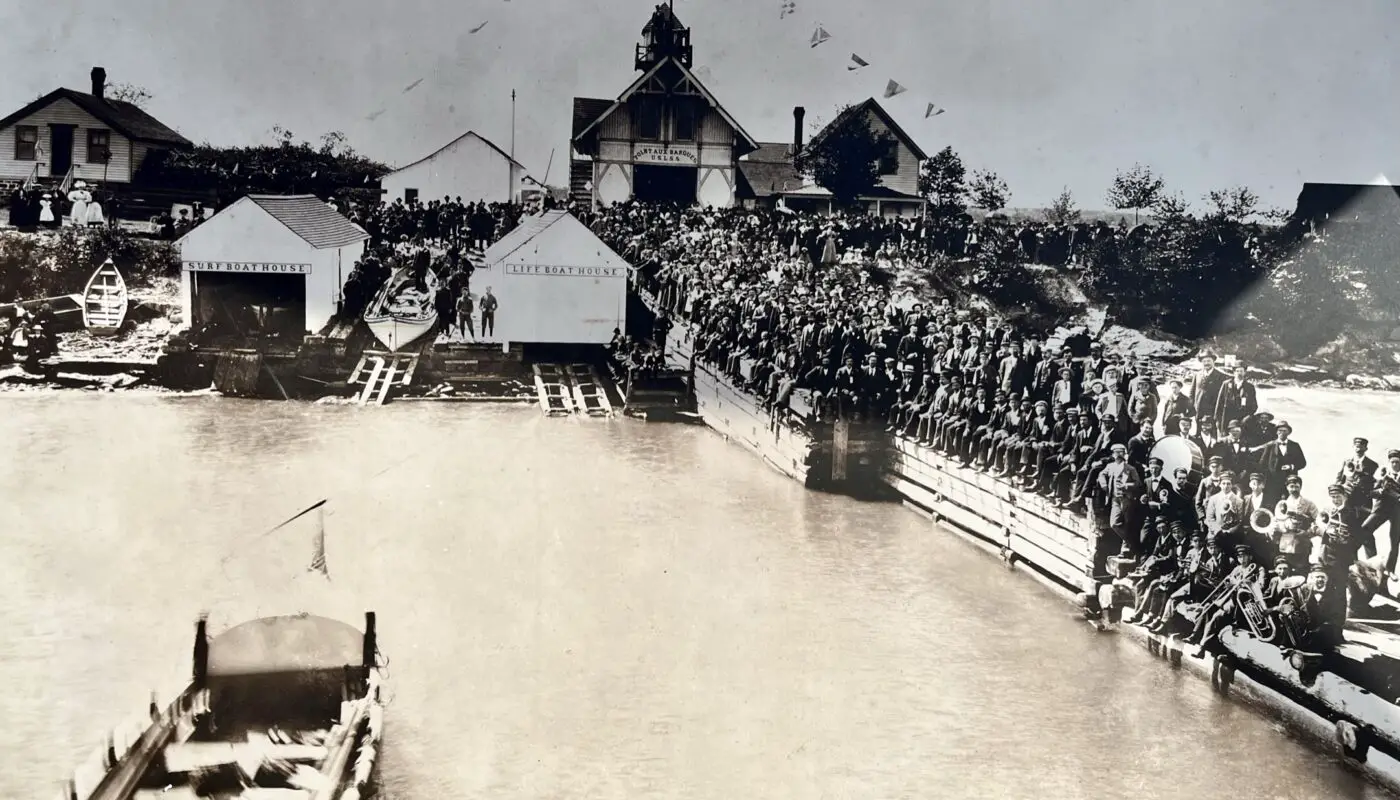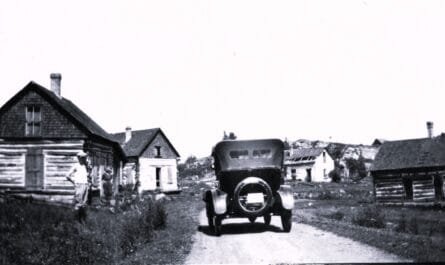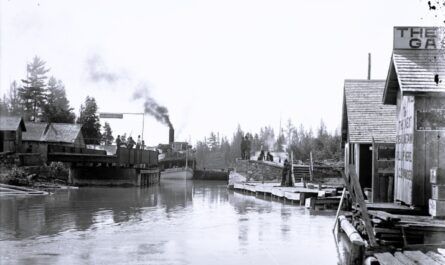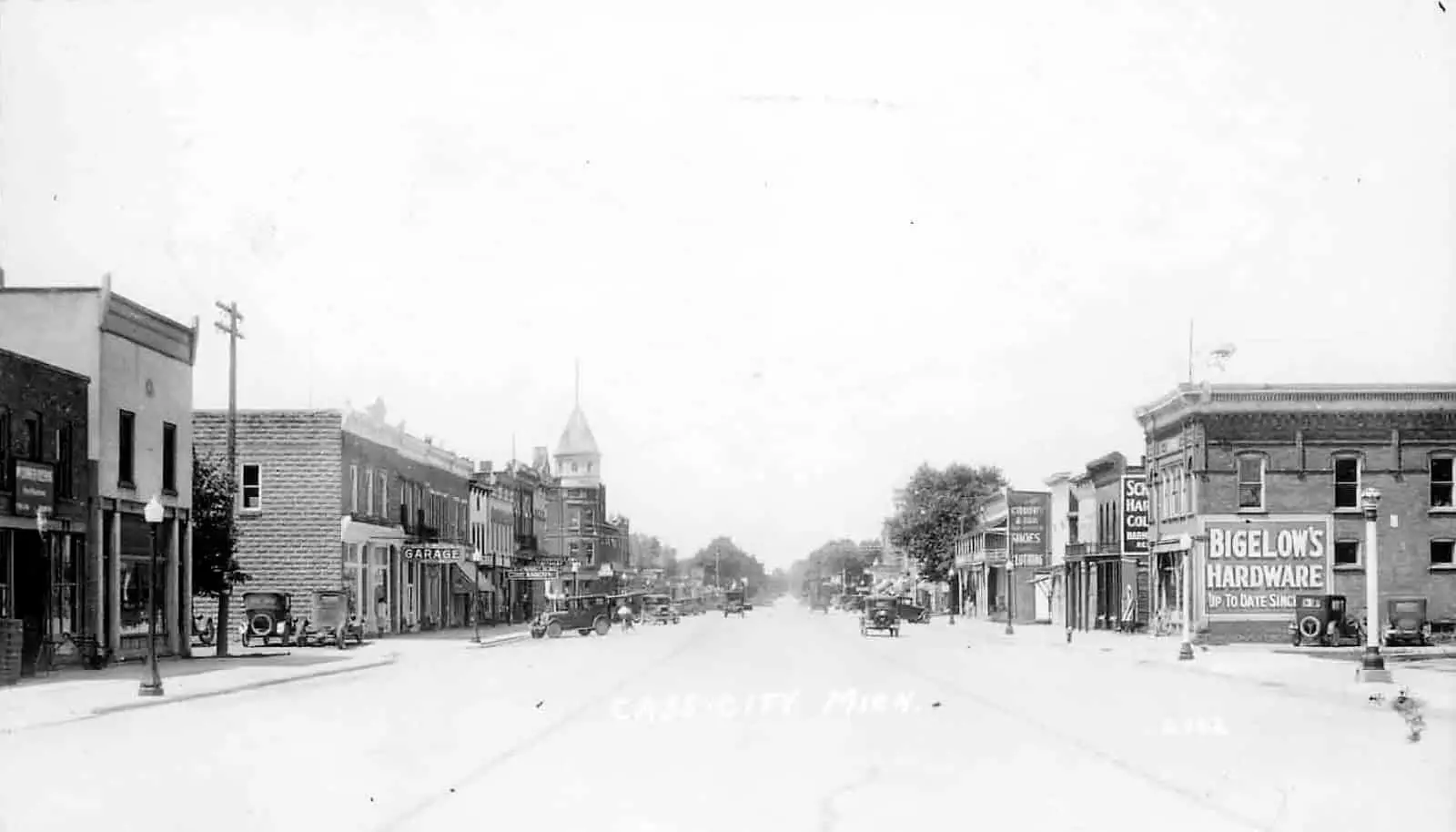By the mid-1800s, during the beginning of Michigan’s lumbering era and intense growth and settlement of the Upper Great Lakes, the shipping industry faced disaster. Over 4,500 vessels were foundered, 1,300 people died, and tens of millions in monetary damages occurred on the Great Lakes. These astounding losses prompted Congress to authorize legislation for constructing the US Life Saving Stations and putting the United States Life Saving Service (USLSS) into operation on the Great Lakes in 1854.
The service replaced the previously all-volunteer life-saving stations and was converted to house-paid crews. The Life-Saving Service was merged into the United States Coast Guard in 1915.
Table of Contents
Disasters on the Great Lakes Prompt Creation of the Life-Saving Service
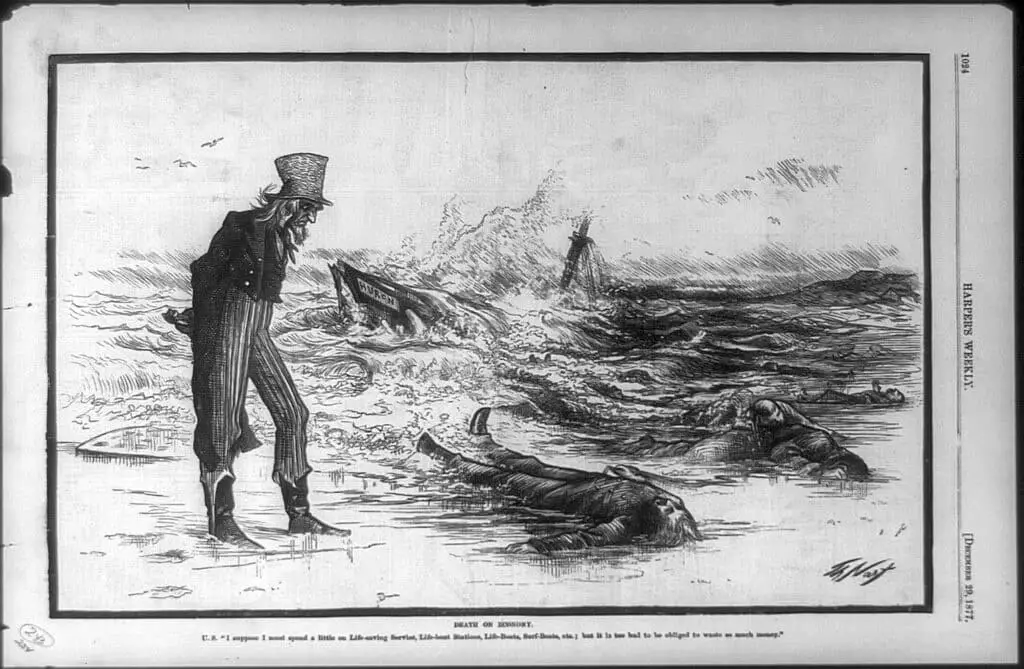
The United States Life-Saving Service was a government institution in the United States that arose out of private and municipal humanitarian initiatives to rescue the lives of shipwrecked seamen and passengers. It was founded in 1848.
Before 1900, there were virtually few recreational boats, and most aid instances came from commercial ships. Almost all lifeboat stations were in or near port cities. Along with piers and other waterfront buildings, deep water allowed marine railroads on inclined ramps to deploy large lifeboats directly into the water. In general, lifeboat stations located on the Great Lakes tended to be in remote and near areas with a history of shipping incidents. The Great Lakes’ active season lasted from April through December.
President Woodrow Wilson signed the “Act to Create the Coast Guard” on January 28, 1915, combining the Life-Saving Service and the Revenue Cutter Service to become the United States Coast Guard. By the time the act was enacted, there were over 270 sites spanning the Atlantic, Pacific, and Gulf of Mexico coastlines and the Great Lakes.
US Life Saving Stations on Lake Huron
Station Lake View Beach, Michigan 1898
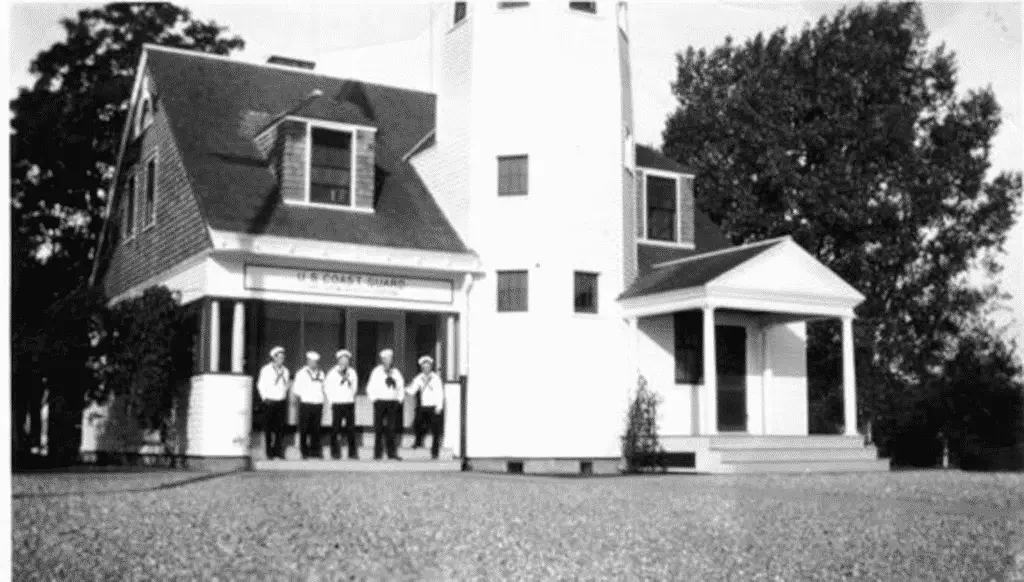
Located five miles north of Fort Gratiot light. Built in 1898 and decommissioned (abandoned) 1946
Station Sand Beach/ Harbor Beach, 1881
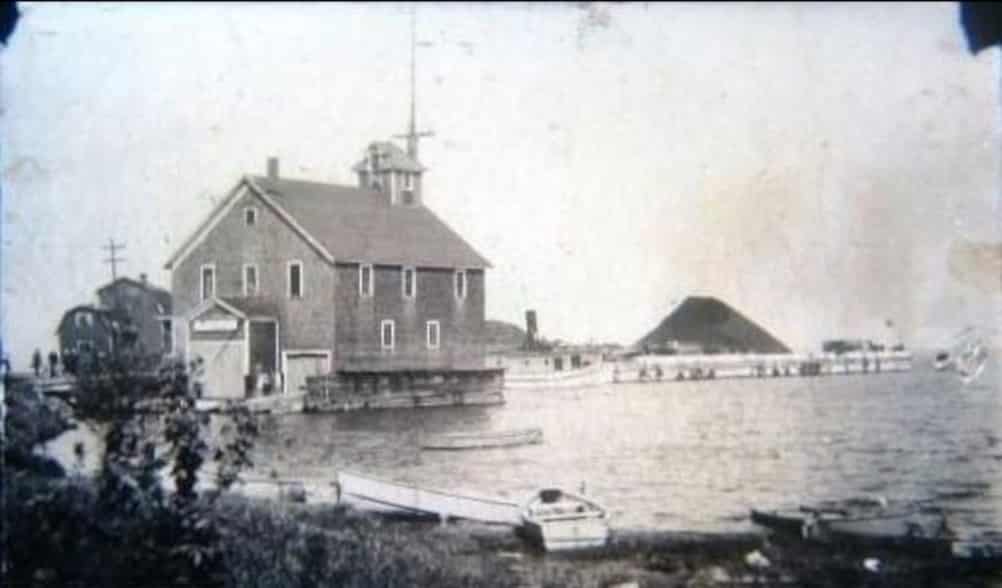
Constructed in 1881 the station was moved in 1898. The station was also known as Sand Beach Harbor or Harbor Beach. Turned over the GSA in 1958.
Station Pointe aux Barques Michigan, 1876
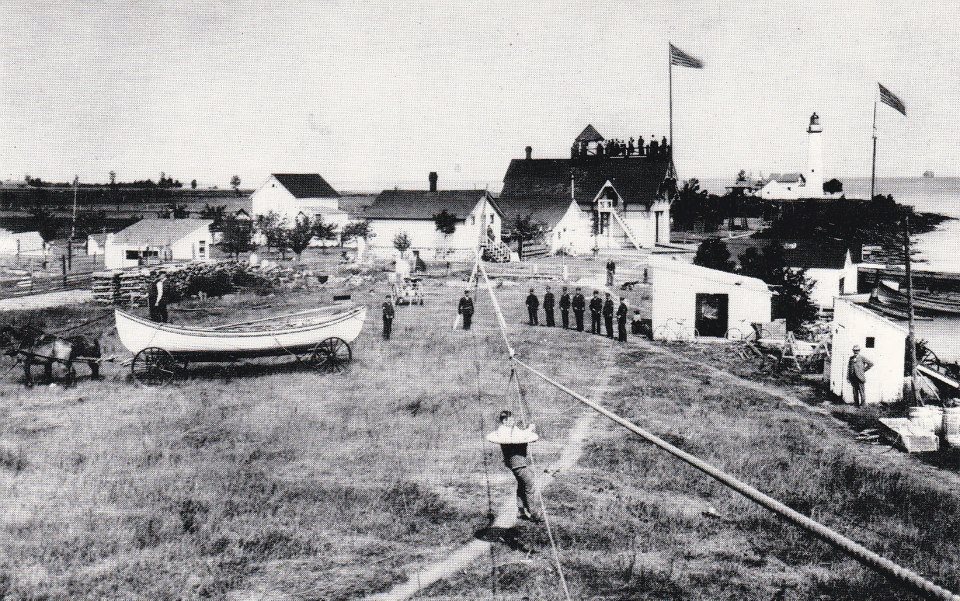
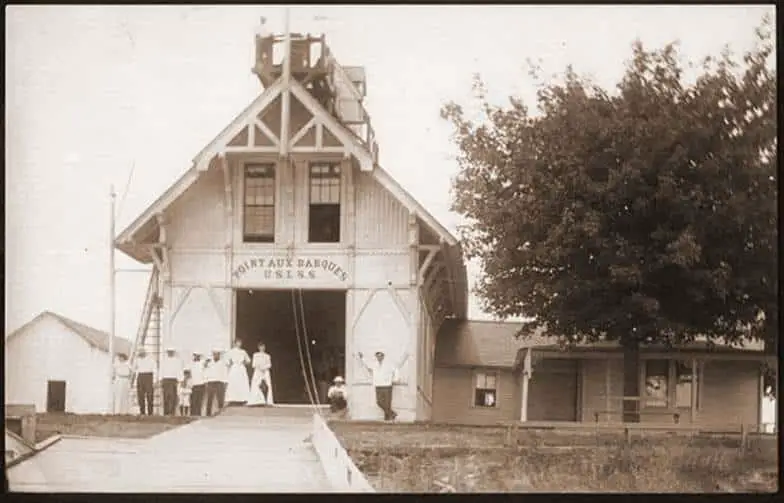
Designated Point Aux Barques USLSS Station #2, Tenth District Coast Guard Station # 248
J. H. Crouch took over as keeper in 1876 and departed in 1877. Charles E. McDonald was hired as keeper on March 12, 1887, and departed in 1880. In 1880, the keeper was Jerome G. Kiah. On April 23, 1880, he was the only survivor of his whole station crew after they launched their lifeboat to save a ship in danger during a storm. The station was turned over to the GSA in 1956.
Station Grindstone City Michigan, 1881
Located about 2 miles northeast of Port Austin, and about 2 miles southeast of Port Austin Reef Light; Lake Huron. Henry Gill, Jr., was appointed 28 September 1881 and was still serving in 1915. The station was decommissioned in 1939.
Station Ottawa Point/East Tawas Michigan, 1876
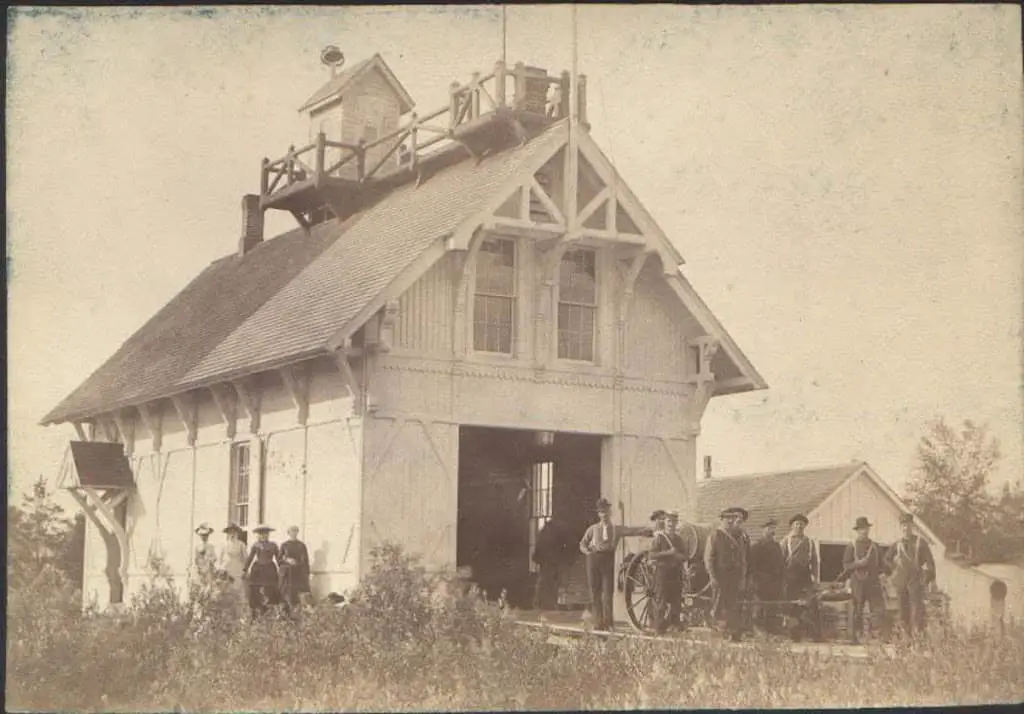
Station Ottawa Point [East Tawas] is designated as USLSS Station #4, Tenth District Coast Guard Station #250. Constructed in 1876 this station is still in operation.
Station Sturgeon Point, 1876
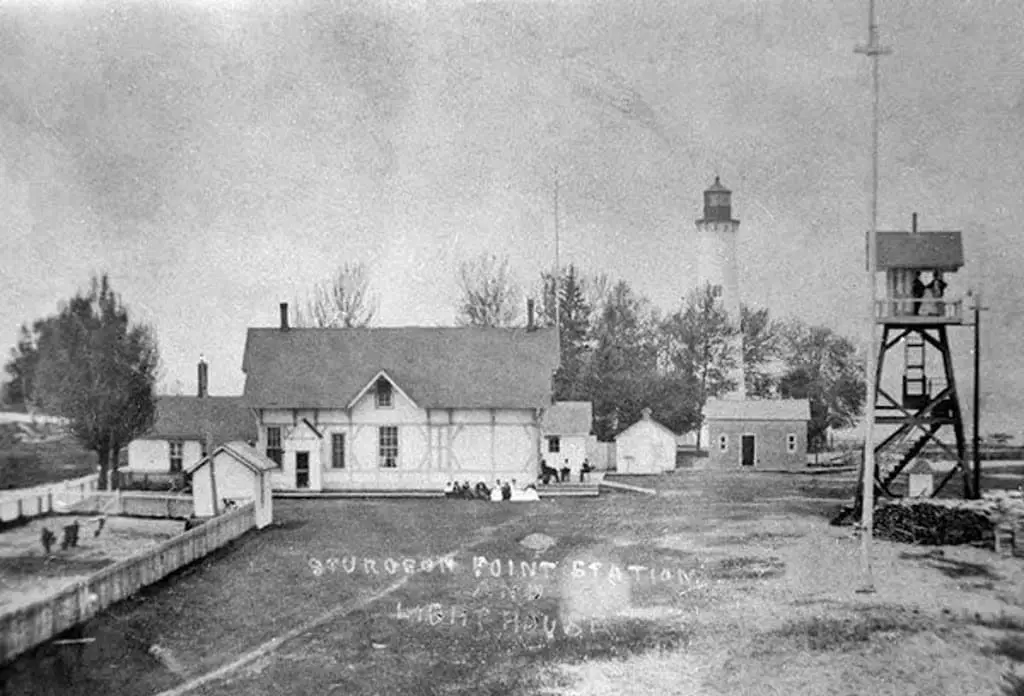
Located near the lighthouse, this is one of the US lifesaving stations operating from 1876 until 1960.
Station Thunder Bay Island, 1876
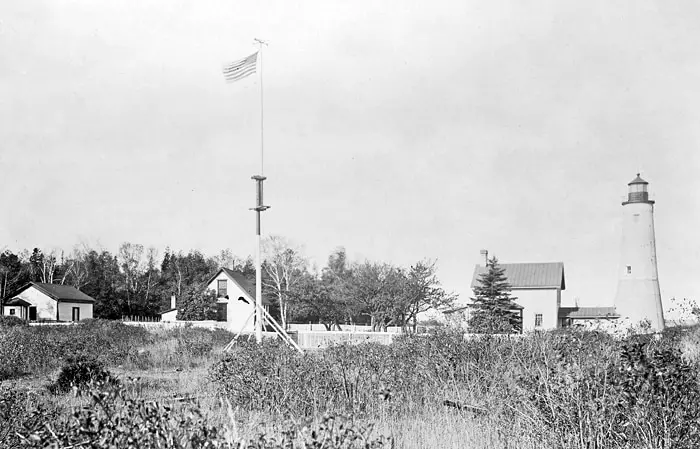
Alpena/ Middle Island, 1881
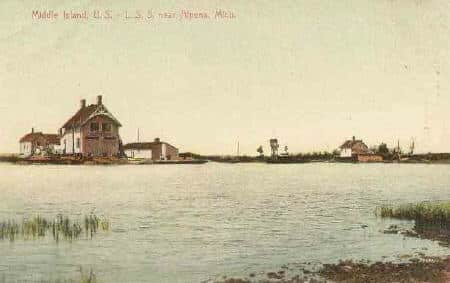
Located on the north end of Middle Island, Lake Huron. The station was turned over to the GSA in 1958.
Hammond’s Bay (formerly Forty-Mile Point), 1876
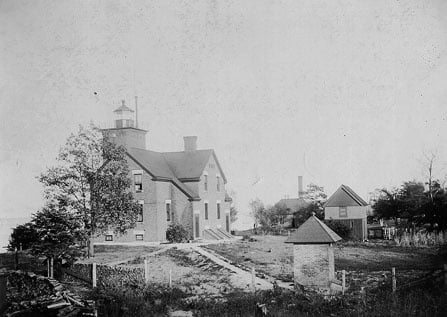
The Hammond Lifeboat Station in Hammond, Michigan, was located in Presque Isle County on Lake Huron. The Lifeboat House was constructed in 1880. In the spring of 1947, the station was deactivated. The US Fish and Wildlife Service later seized the reserve and its structures under permission given by the Commandant of the Coast Guard on March 21, 1950. In 1971, it was transferred to the Department of the Interior’s Bureau of Sport, Fisheries, and Wildlife.
Station Bois Blanc, Michigan, 1891
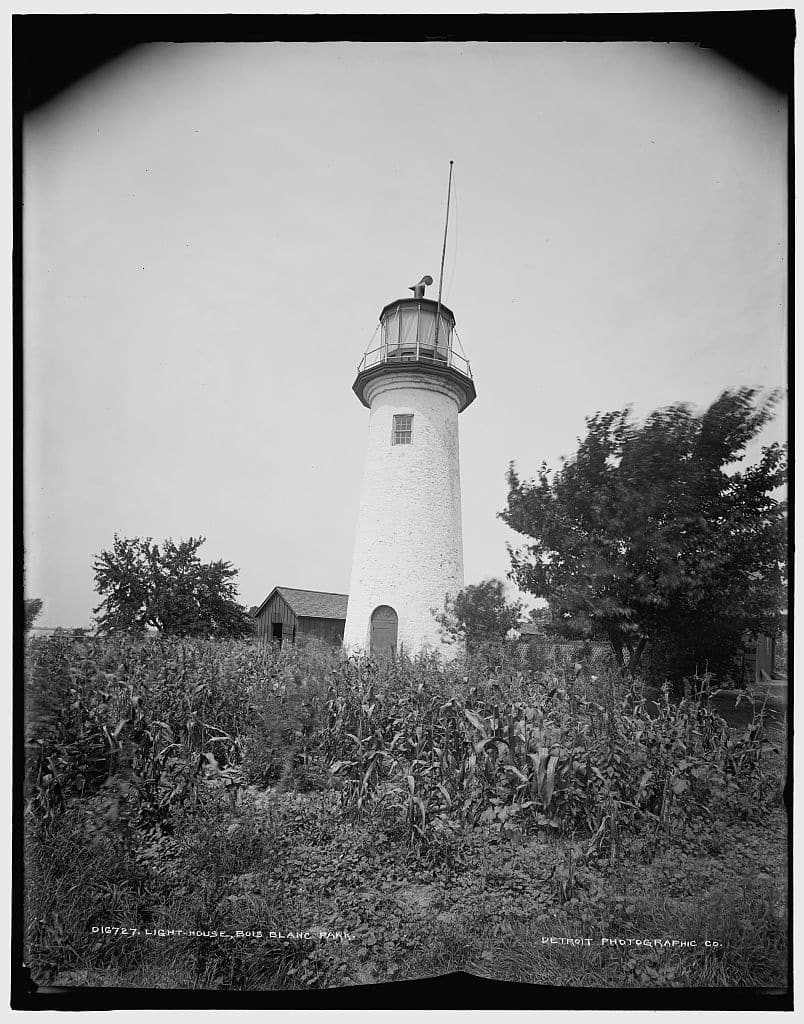
Coast Guard Station Bois Blanc is located at Lake Huron in Mackinac County, Michigan. The buildings of the station were erected in 1890 and rebuilt in 1920.
US Life Saving Stations On Lake Superior
Station Vermillion Point, Michigan 1876
Located ten miles west of White Fish Point in Lake Superior. This station was established in 1876 and merged with the Crisp Point station in 1940.
Station Two Heart River, Michigan 1876
Located near the mouth of the Two Heart River, this Lake Superior station was established in 1876, decommissioned in 1945
Station Crisps Point, Michigan, 1876
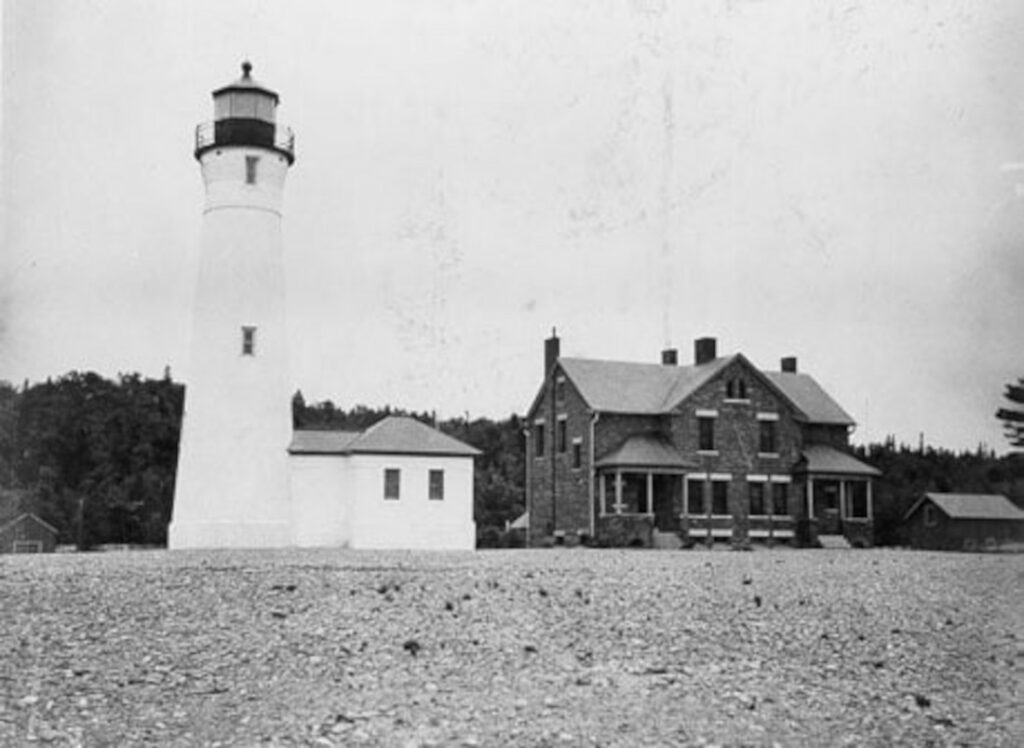
Built in 1875, the Crisp Point Station occupied several sites at various times. The erosion of the land caused the station to be moved frequently. Located 18 miles west of Whitefish Point, Lake Superior. The station was taken over by the Department of the Interior in 1971.
Station Muskellunge Lake, Michigan 1876
Built in 1876 and located across of Muskallonge Lake, 16-1/2 miles east of Grand Marais Harbor of Refuge Outer Light, and 18 1/4 miles west southwest of Crisp Point Light, Lake Superior. Later named Deer Park it operated until 1955.
Station Marquette, Michigan 1891
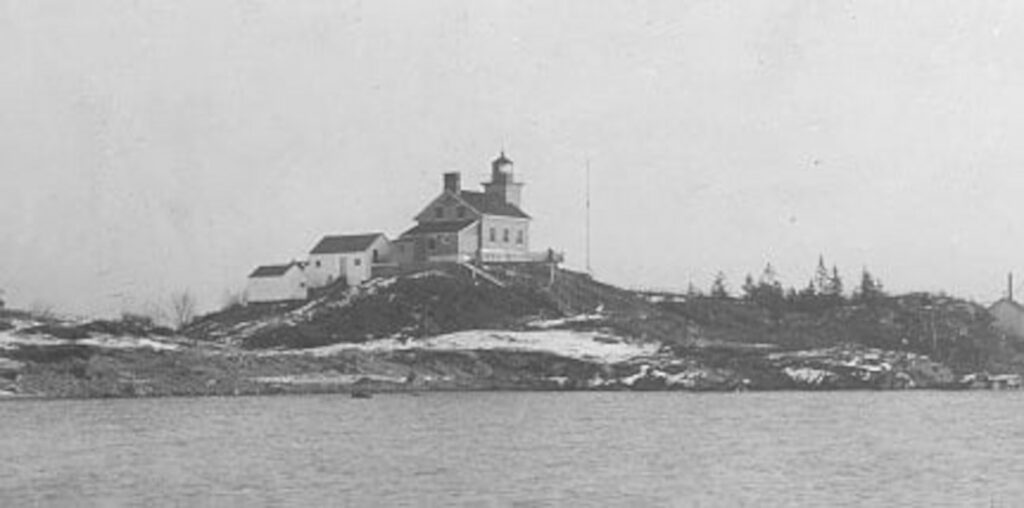
Located east of the city limits, near the inner end of the breakwater, 1/16 mile west of Marquette Light. The station was built in 1890 and still in operation.
Station Ship Canal, Michigan, 1884
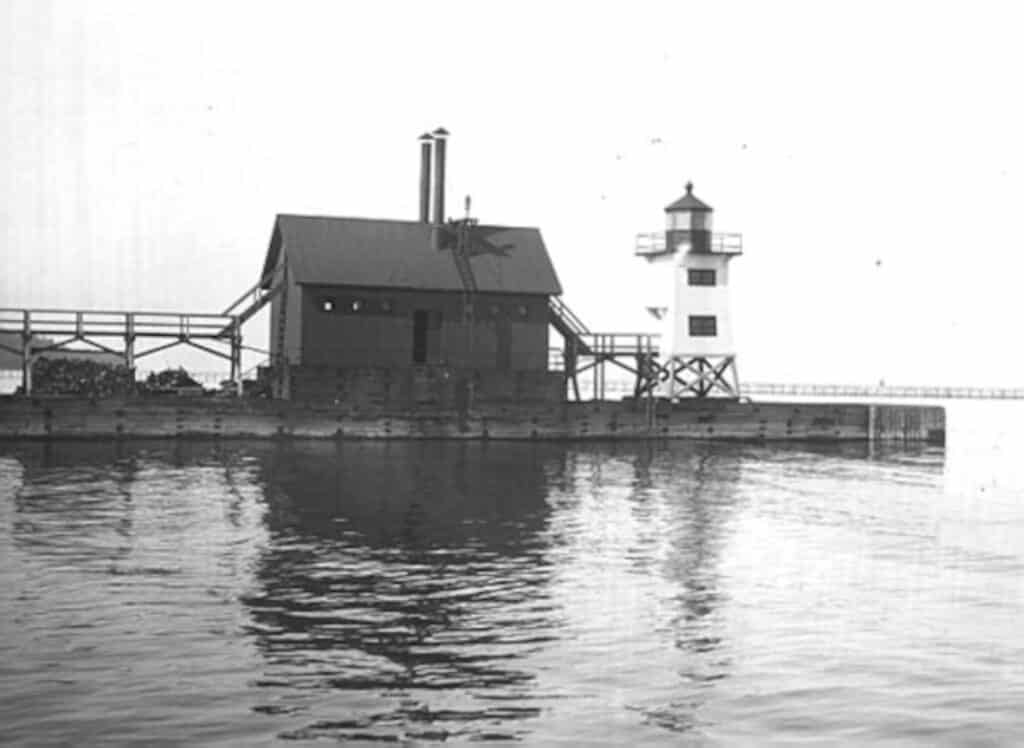
Located on Portage Lake near Hancock, Michigan. This station comprises three buildings: the 1902 station house and boathouse, the 1935 station and three-bay boathouse with a marine railway system, and another tiny utility/storage structure that looks to be from the Life-Saving Service era. These structures sit on 22 acres of land. The station is still in operation.
Station Mackinac Island, 1915
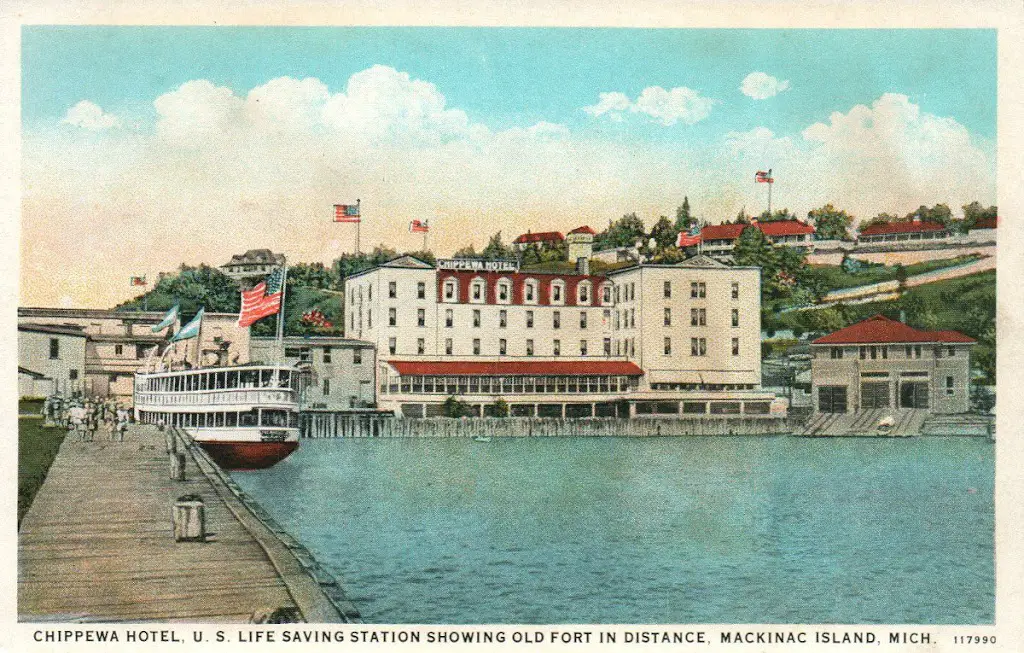
Station Grand Marais, Michigan
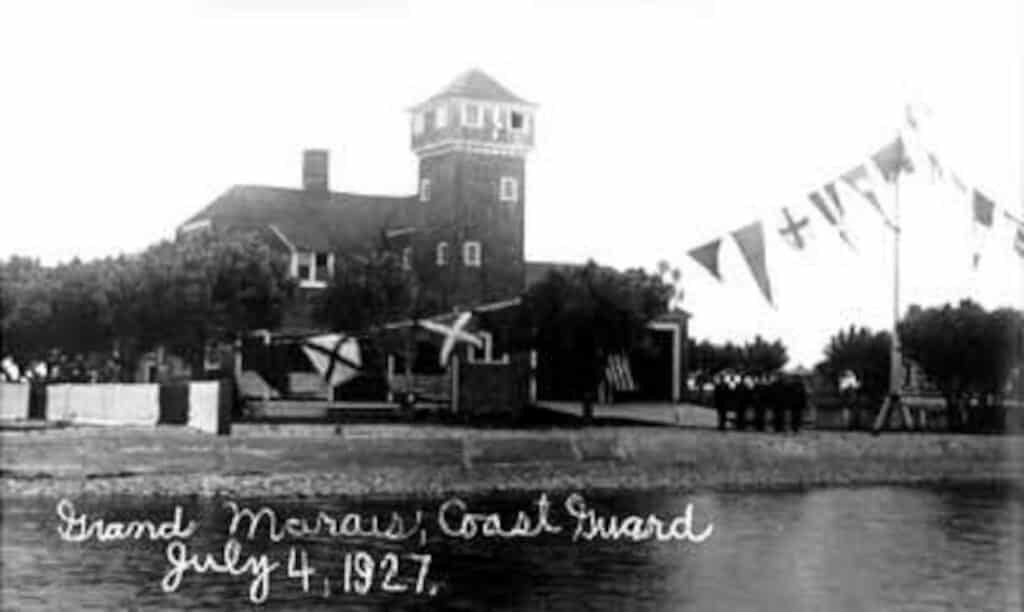
Built in 1899 and located on the west side entrance to Grand Marais Harbor, 1/3 mile south of Grand Marais Harbor of Refuge Outer Light. The station is still in operation.
Station Eagle Harbor, Michigan
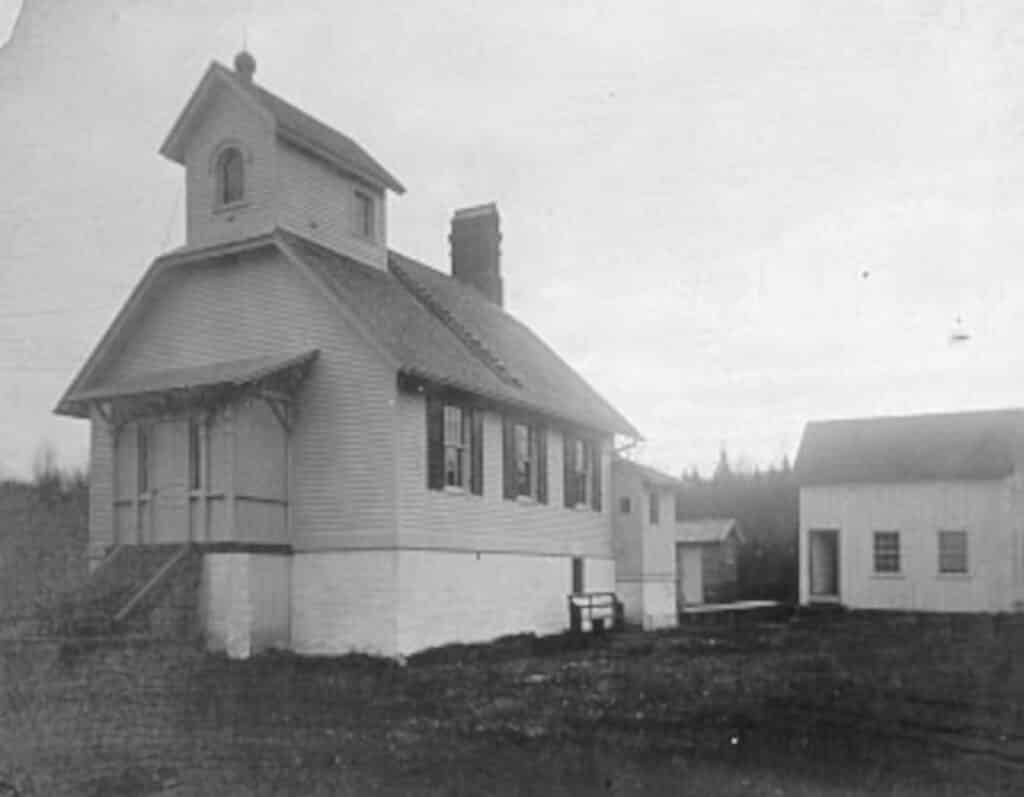
Built in 1912 the station was located on the east point of the harbor, about 1/2 mile east of Eagle Harbor Light. After World War II, the station was decommissioned and turned over to the General Services Administration.
The station was noted for the 1913 rescue efforts of the steamer Waldoon Gull Rock off Keweenaw Point in Lake Superior.
US Life Saving Stations On Lake Michigan
Station Beaver Island, Michigan 1876
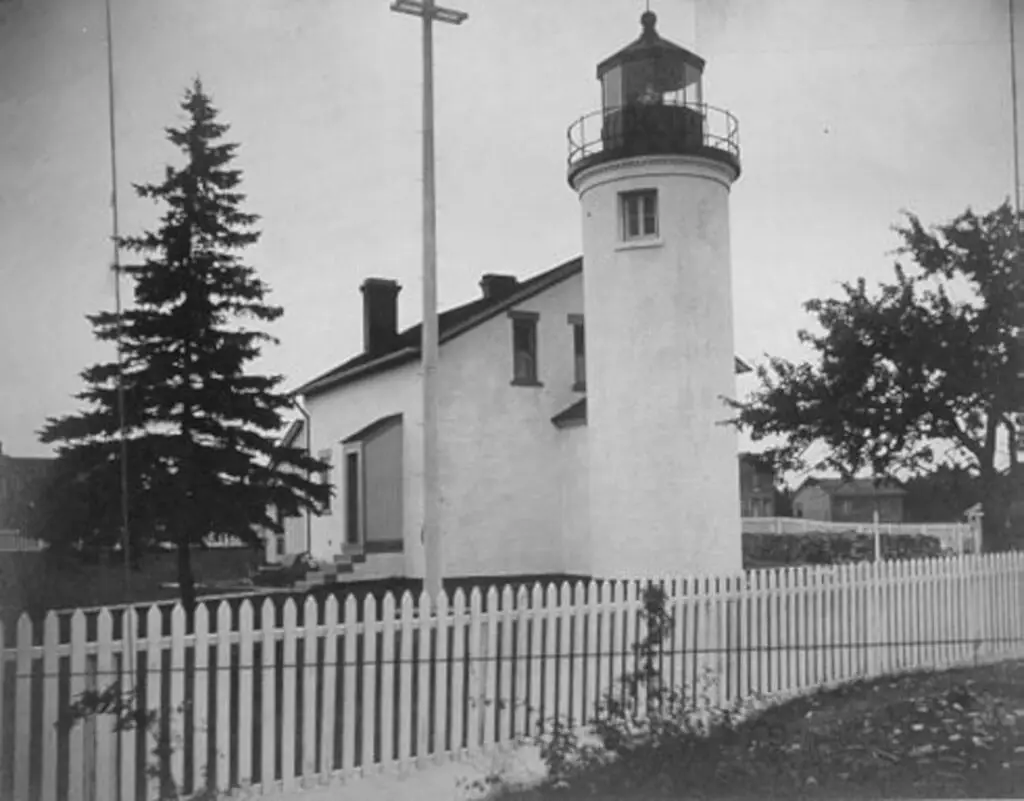
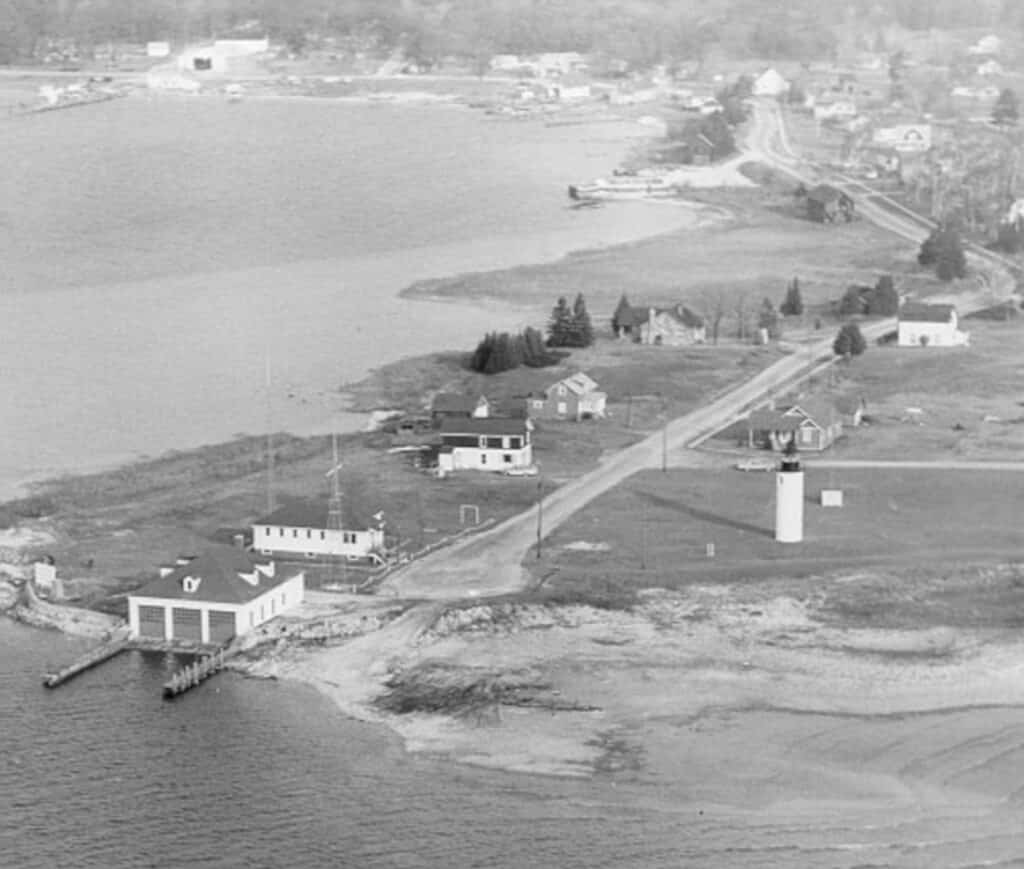
USLSS Station #1, Eleventh District, Coast Guard Station #257, Near the northeast end of Beaver Island, abreast of Beaver Harbor, at Beaver Island Harbor Light. Built in 1875 and decommissioned in 1922.
Station Charlevoix, Michigan
The station was located on the south side of Pine River entrance to Charlevoix Harbor, 1/8 mile east of Charlevoix South Pierhead Light. Constructed in 1890
Station North Manitou Island Michigan, 1876
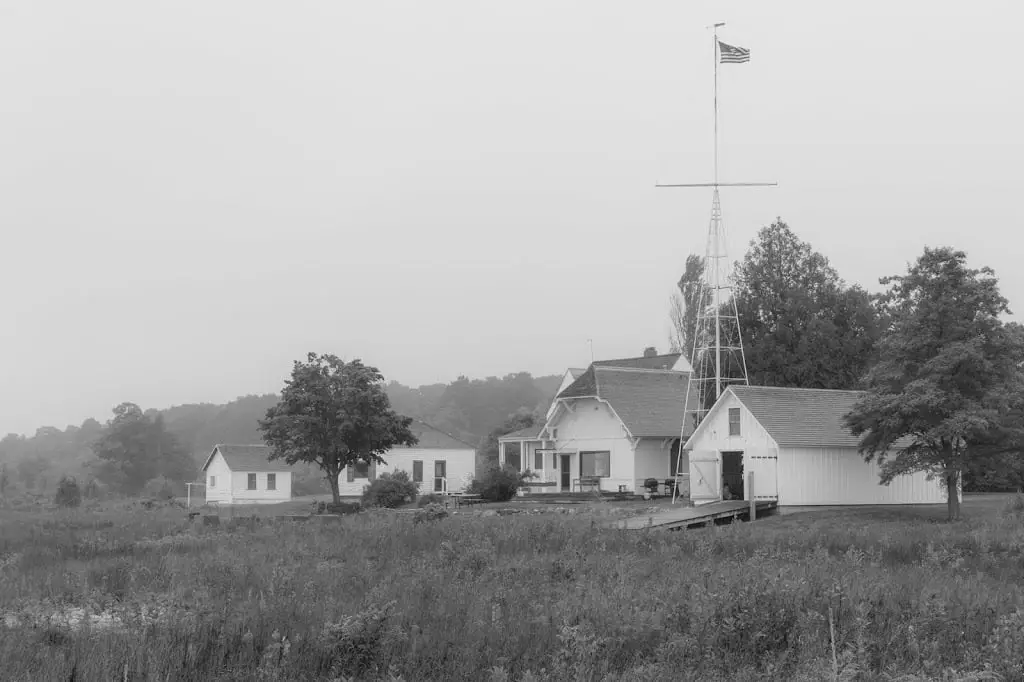
Station Point Betsey Michigan, 1876
Built in 1875, this station was also referred to as the Point au Bec Scies Station, and note that it was located “Near the light-house at Point Betsie, Mich., just south of Point Betsie Light; Lake Michigan.
Station Frankfort Michigan, 1887
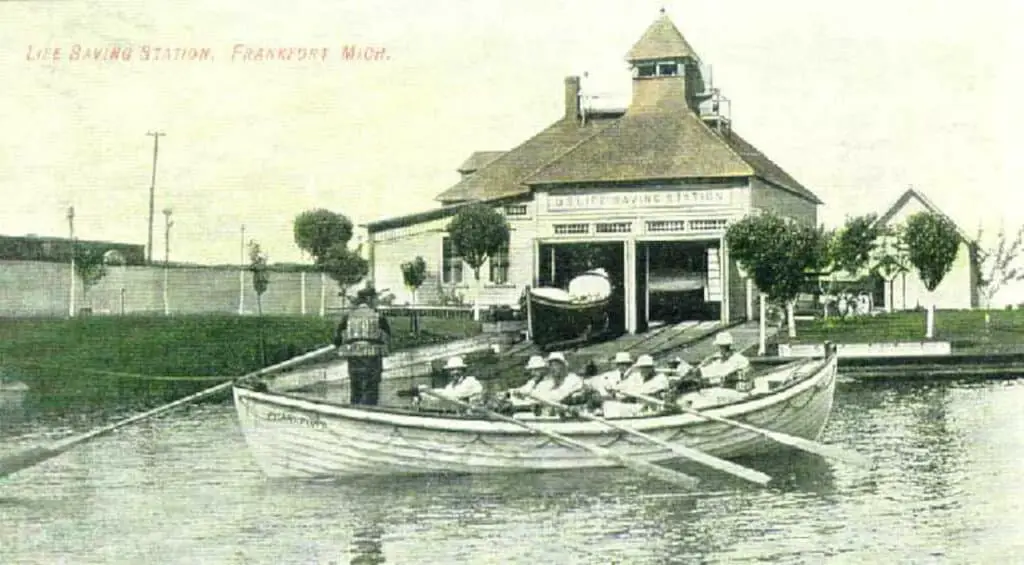
The original Coast Guard Station Frankfort was established on May 4, 1882. The sites were at the south side of the harbor entrance at Frankfort.
Station Manistee Michigan, 1879
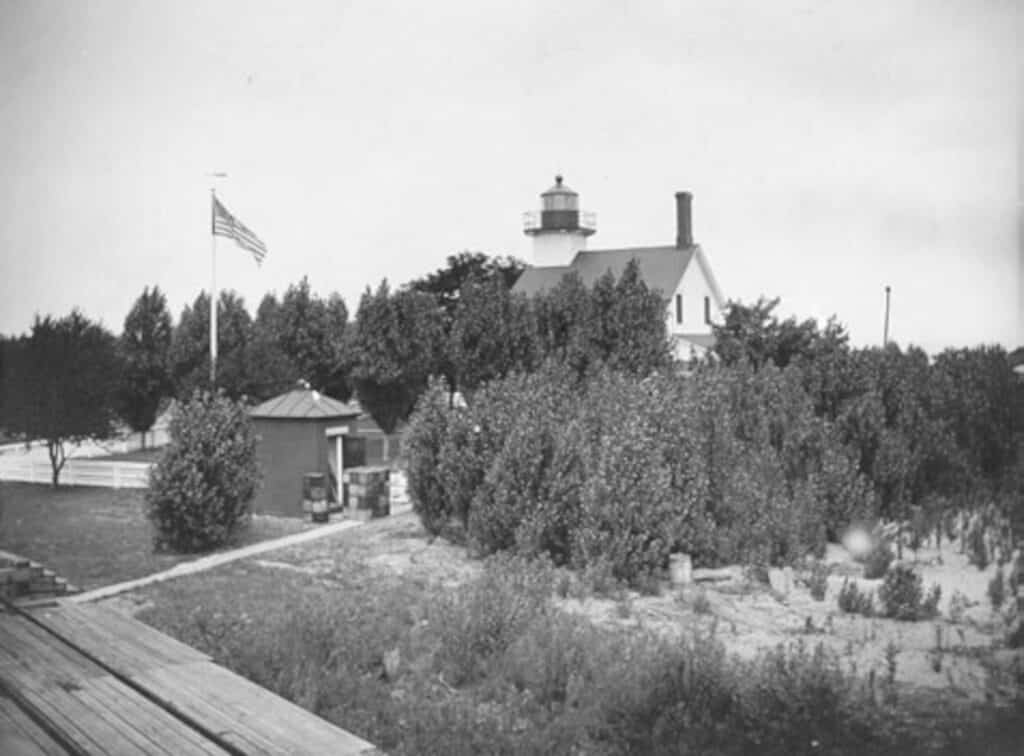
Station Grand Pointe au Sable Michigan, 1876
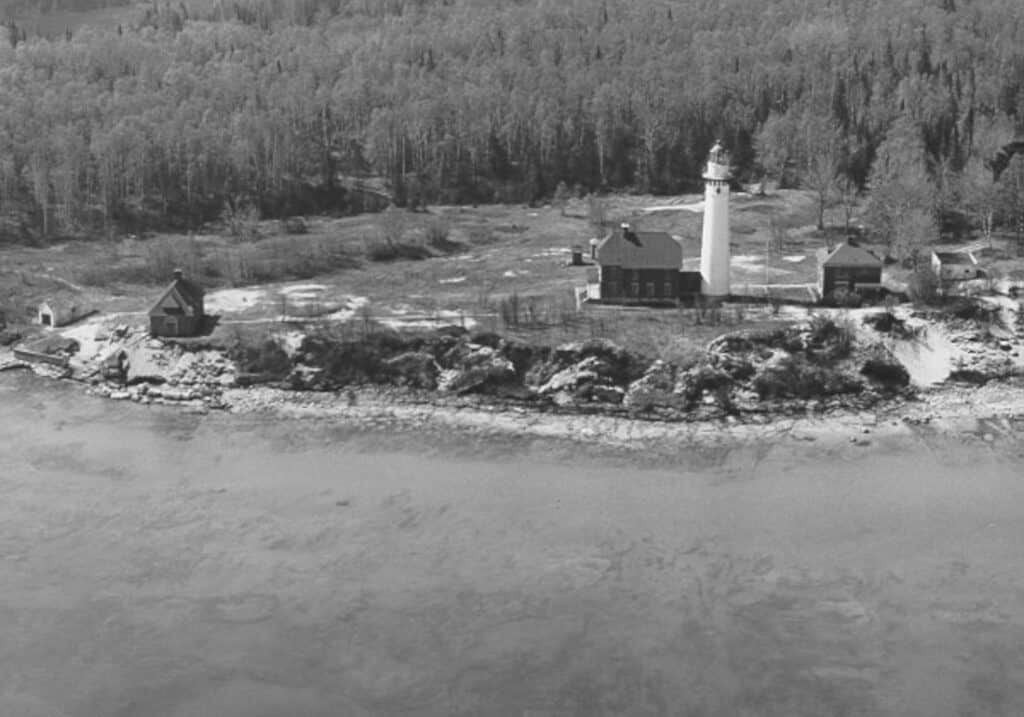
The June 20, 1874 legislation permitted the establishment of a comprehensive life-saving station at “Grand Pointe au Sable.” On May 15, 1877, this station was erected “one mile south of light” and went into service. The station had several names, including Big Sable Point (1923) and Grand Point Sable (1925). In 1937, the station was reported defunct. Except for the fact that it was turned over to the GSA in 1954, it does not appear in documents after World War II.
Station Ludington Michigan 1879
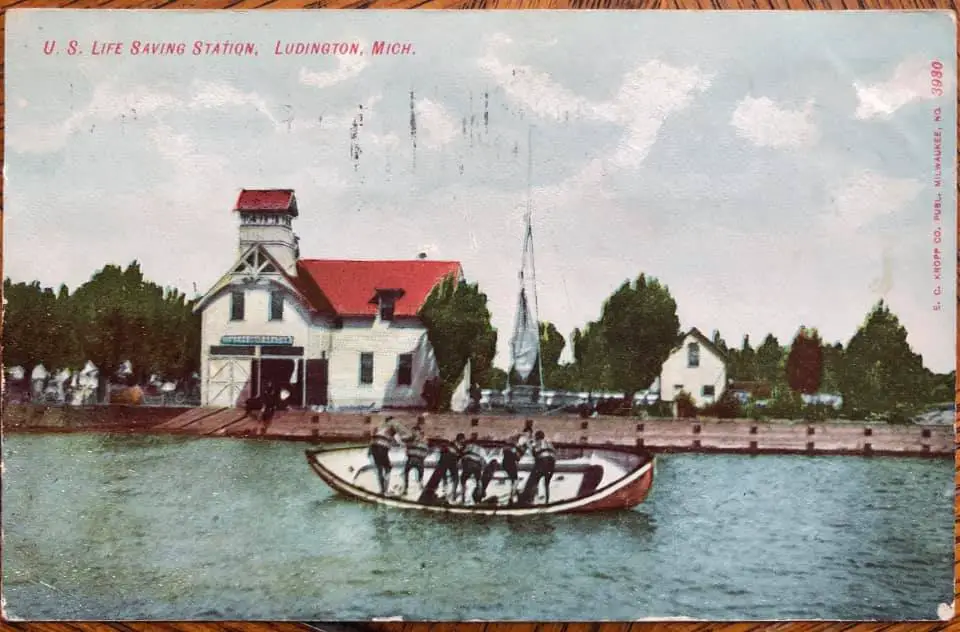
Lifeboat stations were authorized at Manistee and Ludington in 1878, followed by Frankfort in 1882; the Coast Guard has been looking for seafarers in danger across the region ever since. Post Ludington has evolved from a tiny seasonal detachment to a full-time, year-round station. Station Ludington offers rescue for an entire operational area of roughly 35 nautical miles of coastline containing 1,050 square miles and spanning two counties, in addition to its principal area of responsibility from Big Sable Point to Stoney Lake.
In April 2004, a new station building was constructed and commissioned; the 4,200 square-foot structure considerably improved the unit’s efficiency, operating capabilities, and the crew’s comfort. The station handles roughly 100 Search and Rescue cases annually and over 150 boardings with a crew complement of sixteen active duty, four reservists, and more than twenty Auxiliary personnel.
Station Pentwater Michigan, 1887
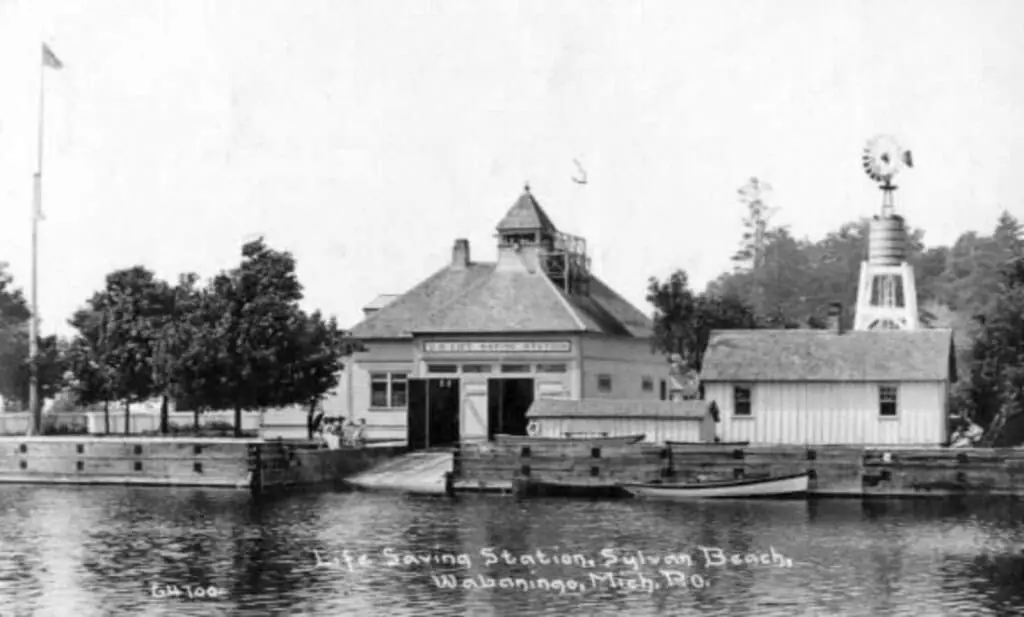
Constructed in 1886 and located north side entrance of Pentwater Harbor, 1/4 mile east of Pentwater Pierhead Light; Lake Michigan. Turned over to the General Services Administration in 1965
Station White River Michigan, 1886
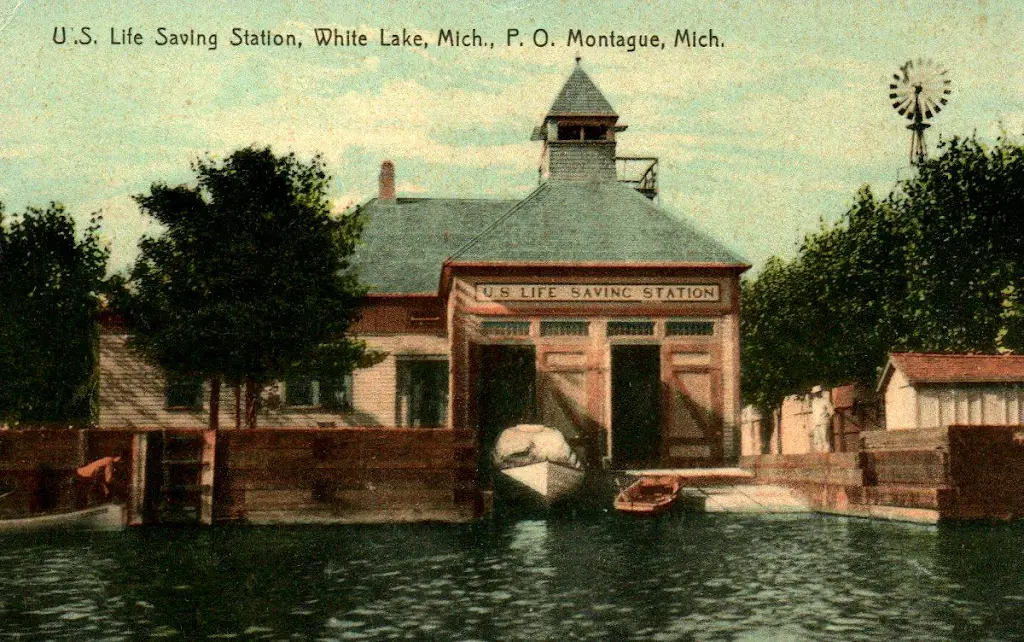
Somewhat confusing due to its location on White Lake near Montague, the White River station was established in 1886 and operated until it was abandoned in 1947
Station Muskegon Michigan, 1879
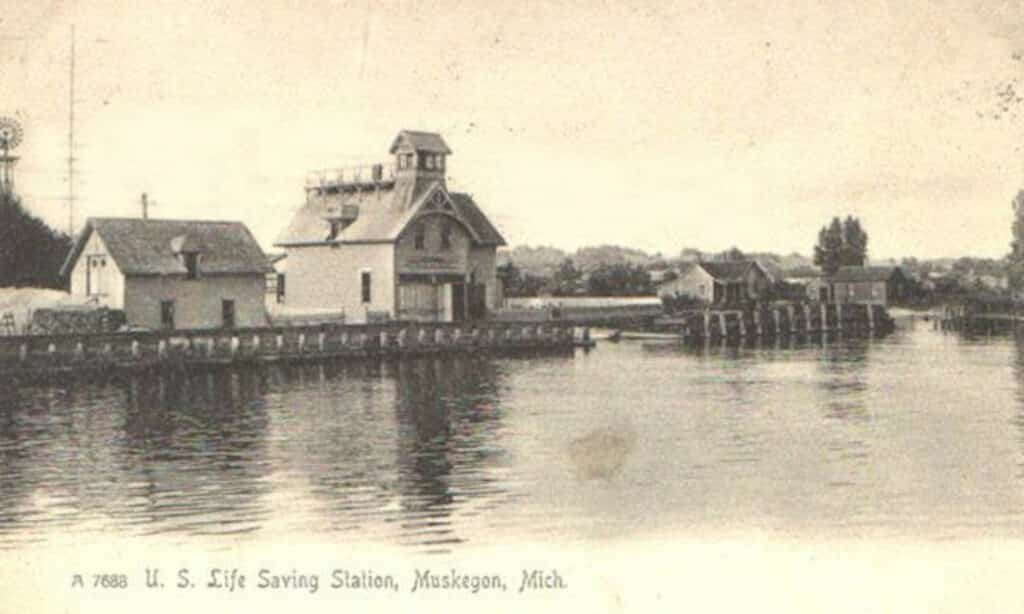
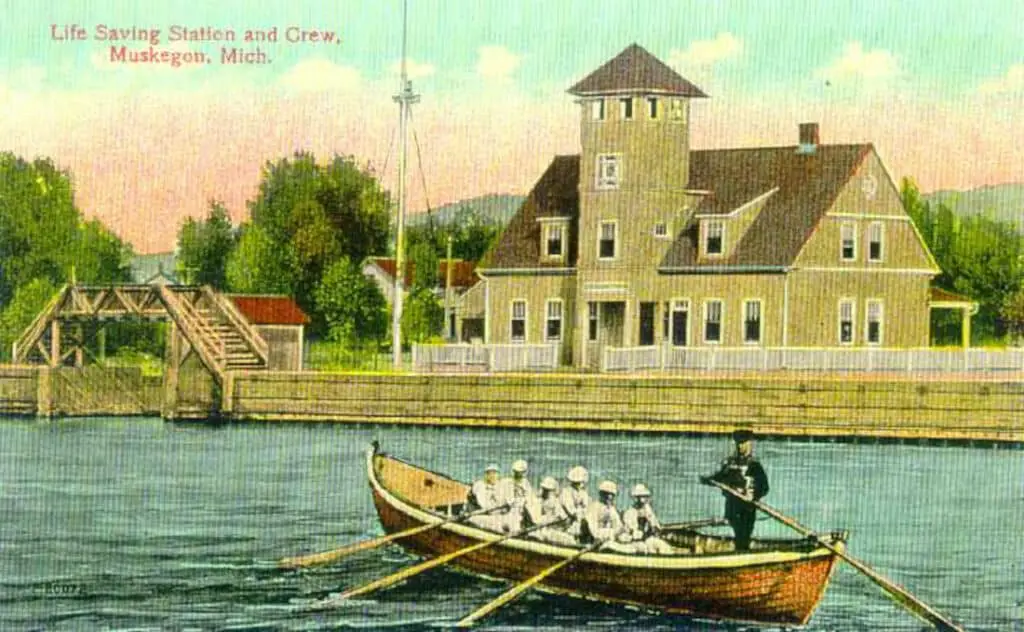
Muskegon Station’s boathouse in Muskegon County, Michigan, was transferred on July 26, 1878. On March 24, 1883, a station site on the north side of Muskegon Harbor was obtained by deed from the same grantor, C.D. Nelson of Kalamazoo, Michigan. The station buildings were at grave risk of being swept away in 1903, therefore it was determined that a new location on the harbor’s south bank would be preferable. The trustees of the Pere Marquette Railroad Co. transferred to land by deed dated July 18, 1904.
Station Grand Haven Michigan, 1876
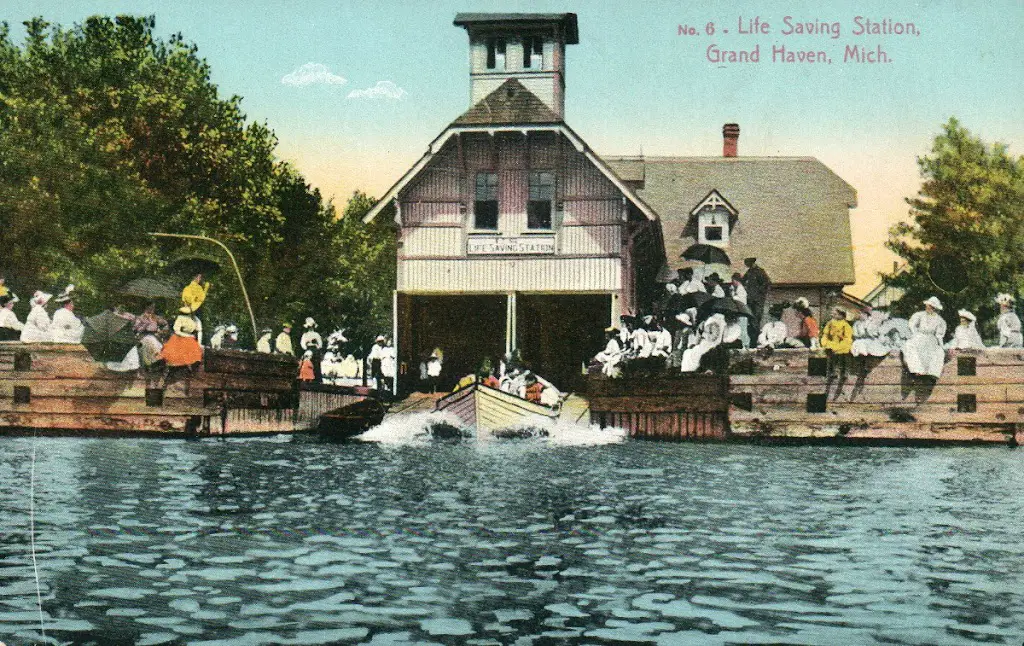
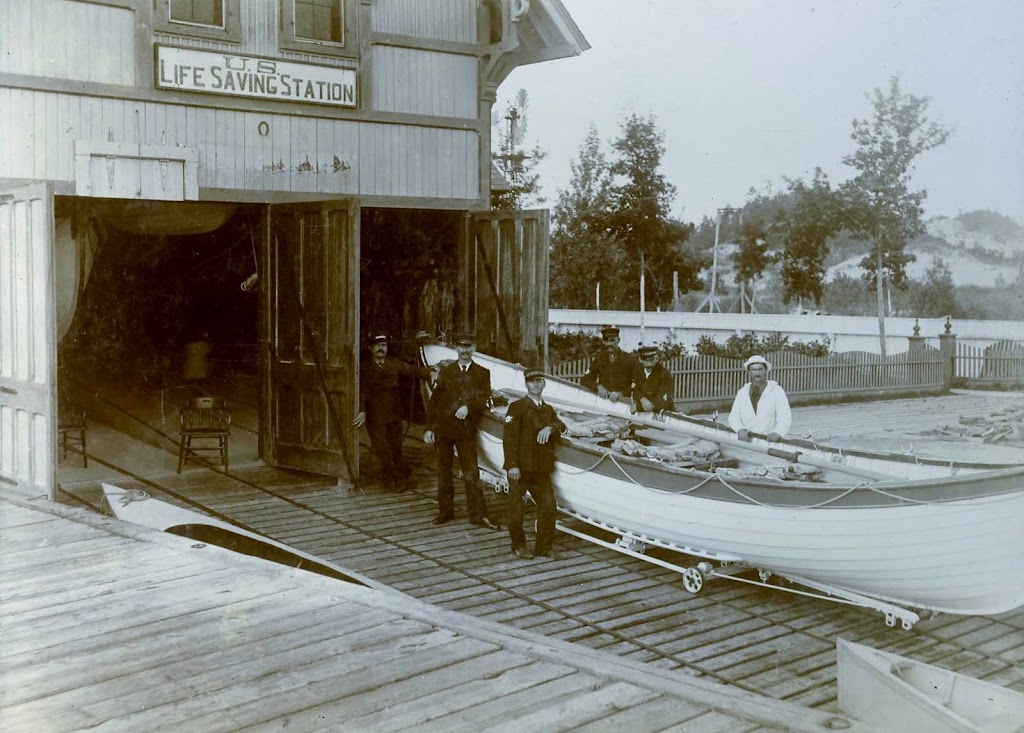
USLSS Station #9, Eleventh District Coast Guard Station #270 Built in 1875 and is still in operation.
Station Holland Harbor Michigan 1886
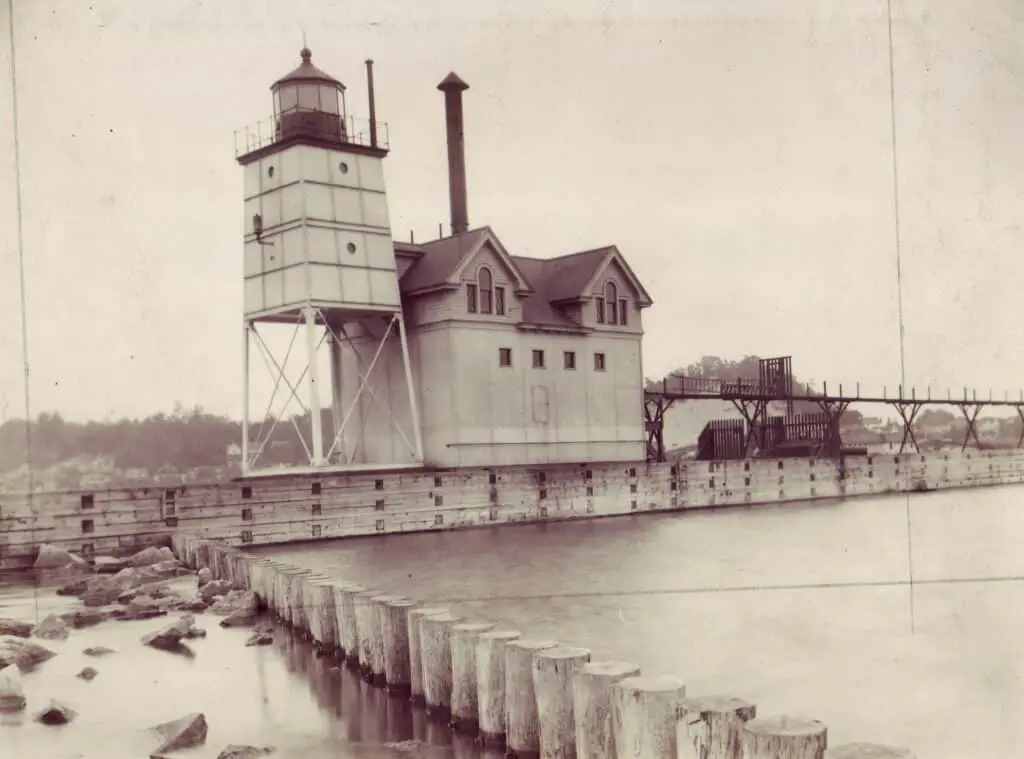
Station Holland Michigan, 1886
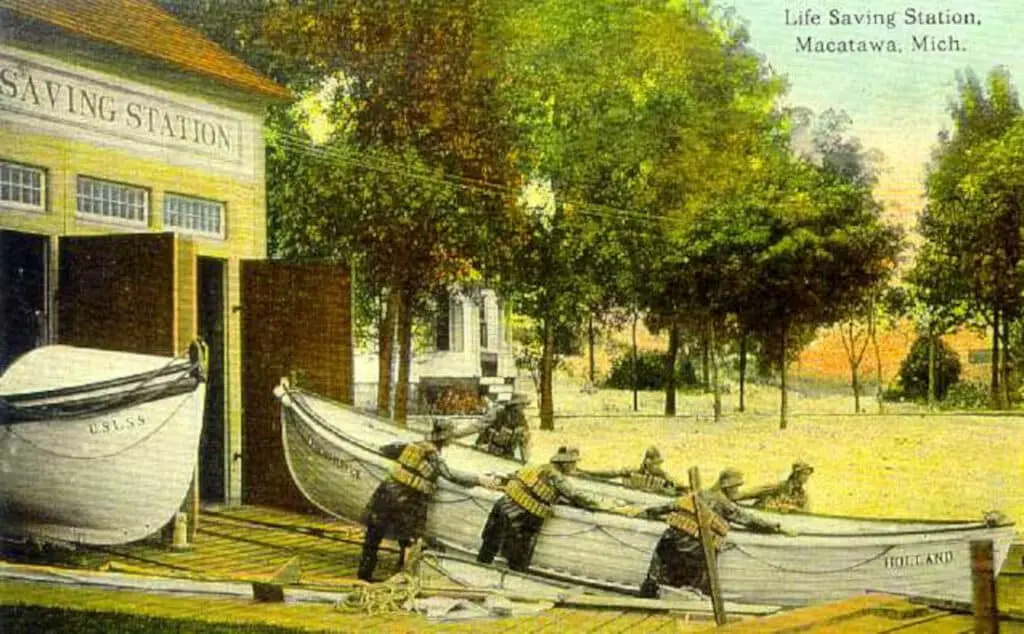
The Holland Lifeboat Station was in the Township of Park in Ottawa County, Michigan. In January 1964, some land was turned over to the GSA. More property was ceded to the US Army Corps of Engineers later that year. Since 1870, a lighthouse had been in service. The land for the lifeboat station was purchased between 1875 and 1884.
Station South Haven Michigan, 1887
In 1872, the site for Coast Guard Station South Haven was purchased. That same year, the station’s residence was built. In 1887, a US Life Saving Station was established. South Haven, Van Buren County, Michigan, is the property’s location. In 1905, the station was relocated to the south side of the port entrance. Until March 1972, the house was inhabited. The station was decommissioned in 1973 and transformed into an Auxiliary enhanced outfit with no regular staff attached.
Station St. Joseph Michigan, 1876
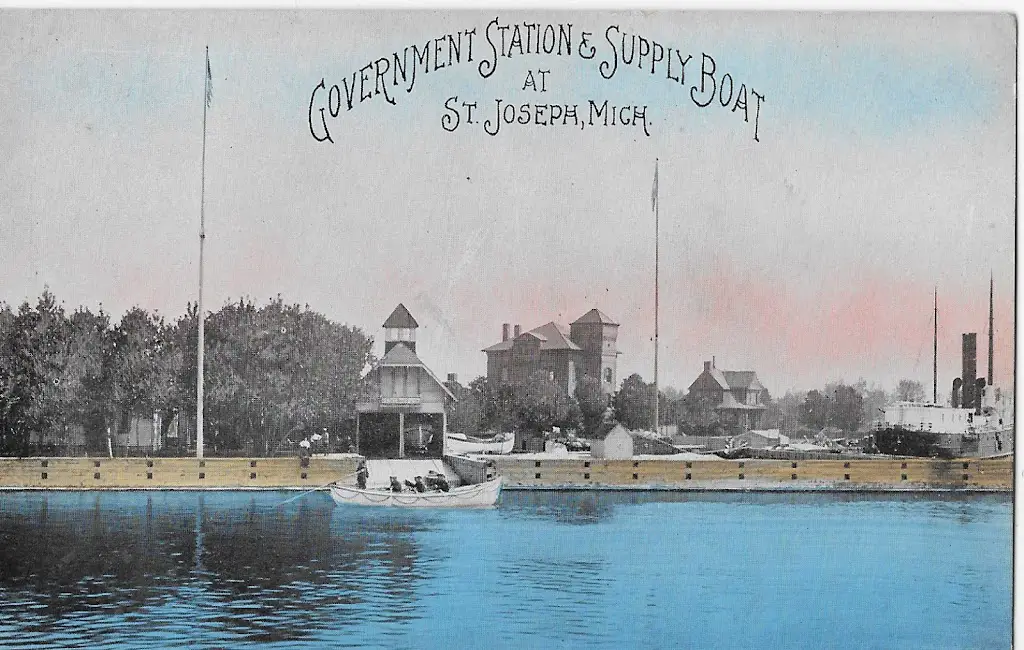
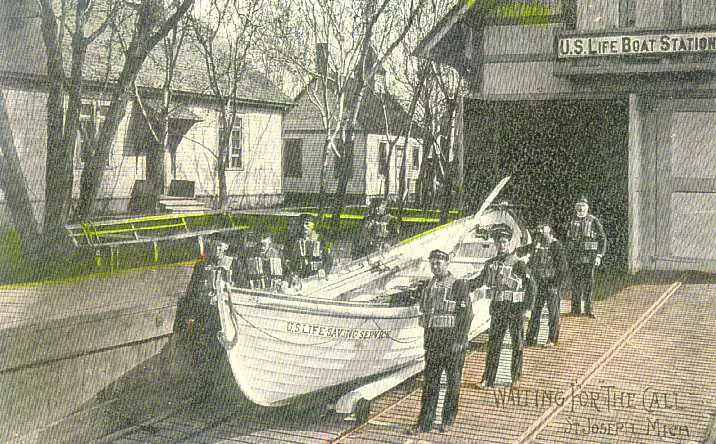
Station Saint Joseph, Michigan designated USLSS Station #10, Eleventh District Coast Guard Station #273. Located north side entrance to St. Joseph River, 7/16 miles east southeast of Pierhead Rear Light; Lake Michigan
Station Sleeping Bear Point Michigan, 1901
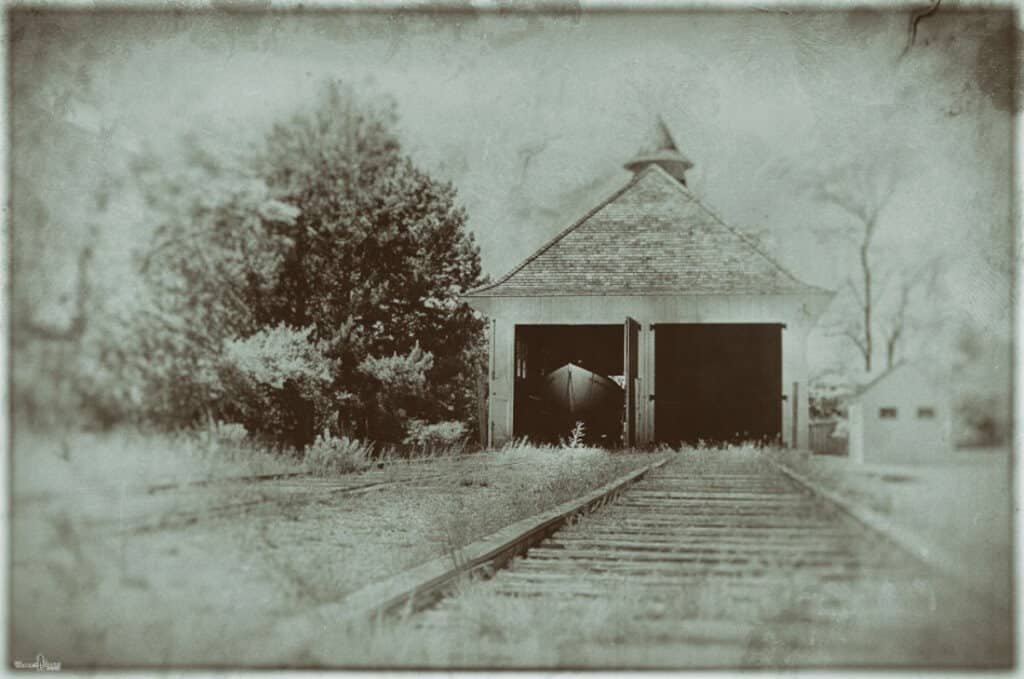
Built in 1901 USLSS Station #3, Eleventh District Coast Guard Station #261 is located on Sleeping Bear Bay, near Glenn Haven, 7 miles south southeast of South Manitou Light; Lake Michigan
US Life Saving Stations On Lake St Clair & Detroit River
Station Belle Isle, Detroit Michigan
The station was built in 1881 and, formerly known as St. Clair Lifeboat Station, was designed by the Ninth Coast Guard, Civil Engineering Section, Cleveland, Ohio. It is primarily a search and rescue operation and is still active today.
Station St. Clair Flats
This station is listed in Dennis Noble’s book “A Legacy – The United States Life Saving Service” but not by the US Coast Guard. Research continues.
Station St Clair Shores
This station is listed in Dennis Noble’s book “A Legacy – The United States Life Saving Service”; however, this is not listed by the US Coast Guard. Research continues.
Sources
United States Coast Guard – U.S. Department of Homeland Security
Related Reading US Life Saving Stations
Henry Ford’s Village Industries Experiment
